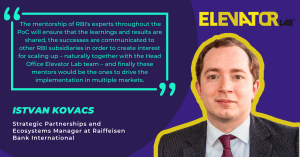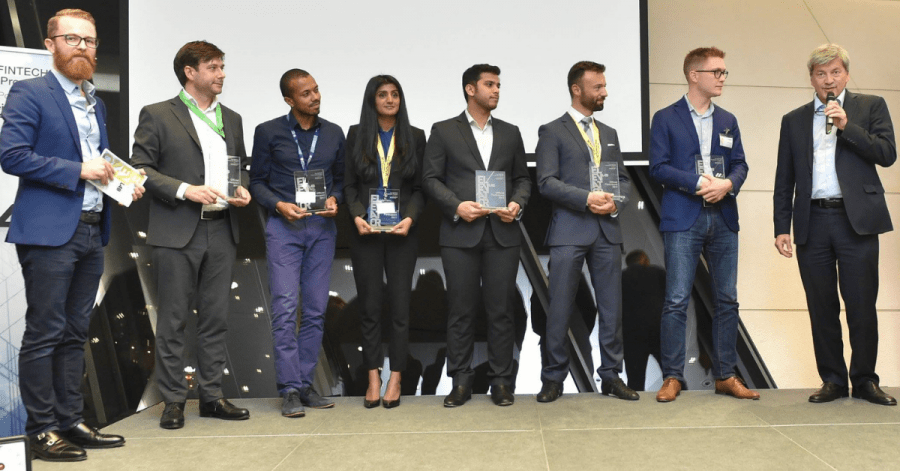What does it take for a big financial institution and modern fintech company to develop a successful partnership? For starters, it is a readiness to adapt and be flexible on the side of the banks, and patience and swift reactions on the side of the startups. This is what Raiffeisen Bank International (RBI) has learned after 4 years of close collaboration with global fintech innovators as part of its Elevator Lab program for scaling fintech startups. So far, there have been 4 editions of group-wide Elevator Lab programs. During that time, RBI conducted more than 25 pilot projects with CEE fintech startups, which resulted in more than 10 established fintech partnerships.
As the program is still accepting applications before the deadline on the 26th of September, The Recursive team once again met the team of RBI innovators to showcase the progress that previous participants in the program have made and to learn more about the bits and bolts of a corporate-startups partnership. This time, we are also presenting you the perspective of one of the startups that has previously participated in Elevator Labs and had the chance to do a PoC with RBI.
Value-added innovation on focus
Being first in the market with a product or a service is of key importance for success but the fintech solutions that RBI is looking for should strive to bring a real value-added to the clients of the bank. As an example, this can be a fintech product that simplifies the process through which customers interact with the bank such as allowing them to sign documents digitally. The Bulgarian startup for e-Identification and e-Signatures, Evrotrust, which won the 2018 Elevator Lab Challenge Bulgaria, proved its potential to offer a value-added to the bank’s customers, and after doing a PoC in Bulgaria, it was also contacted for PoCs in Albania and Romania. With another Bulgarian startup that participated in the 2018 edition, the blockchain data privacy startup LogSentinel, the financial institution is already working in the field of cyber security.
Value-added for the customers can also be in the form of making online shopping more affordable. This is how the buy-now-pay-later startup Vnoska.bg, with which Raiffeisenbank Bulgaria is partnering for the development of its first credit card for monthly repayment with no interest, enables the bank’s customers to afford to purchase more of the products and services they want. And since customer feedback is essential in order to understand whether the bank is moving in the right direction, thanks to collaborating with Pisano, Raiffeisenbank Bulgaria is able to elevate the customer experience of its clients by allowing them to provide their instant feedback on the service quality they receive. In addition to conducting a PoC as part of the Elevator Lab Challenge, the startup that transfers customer notifications gathered at the service location received investment from the CVC of Raiffeisen Bank International, Elevator Ventures.
Moxtra was one of the Participants of the global Elevator Lab challenge in 2017, which was also the first edition of the program. Together with the embeddable, omnichannel client engagement platform, RBI developed the virtual branch service, RaiConnect. The customer collaboration platform for secure digital consultations allows clients to connect with their relationship managers, easily exchange documents, and conduct video calls.
Startup spotlight: How did Moxtra develop a partnership with RBI?
EMEA Director of Enterprise and Corporate Solutions at Moxtra, Martin de Heus, shares that even though the company was not experiencing any scaling challenges, having RBI’s expertise helped them learn the specific workflows and use cases in the banking space.

According to him, the biggest value-added element that Moxtra walked away with from the Elevator Lab program back in 2017-18 was the ability to collaborate with RBI experts to run a pilot with real customers. “Through the pilot, we were able to validate the business case for RBI based on feedback from customers and internal users and we were also able to validate the technical feasibility of integrating our solution with RBI’s products. Also, we were able to showcase the solution at the end of the program to generate interest with key stakeholders throughout the bank,” Heus says.
After the end of the program, Moxtra worked closely with the RBI Head Office team to implement learnings from the pilot and develop a scalable solution across the network banks. Heus shares that the intention from the beginning was to transition from pilot to production provided that the key success criteria in the pilot were met. And then he told us more about the main benefits of working with RBI subsidiaries and Raiffeisenbank Bulgaria in particular:
“Moxtra worked with Raiffeisenbank CR (Czech Republic) for the pilot. This was a unique experience since an engagement with banks typically takes a long time, which can be difficult for startups. Working with an RBI subsidiary as part of an accelerator program allowed Moxtra and RBI to test the solution quickly and meaningfully,” he explains.
Additionally, Heus points out that a PoC with a local institution of an international corporation can help in scaling throughout different markets. “A PoC with a local institution was the best way to prove the solution since it would take too much time and is too high of a risk for an international to roll out a solution across several geographies. Showcasing a successful PoC with one local institution is helpful and critical to generating interest with other local institutions,” Heus adds.
Istvan Kovacs, Strategic Partnerships and Ecosystems Manager at RBI further, elaborates that Raiffeisenbank in Bulgaria has been a part of the Elevator Lab program right from the start. “The local management is really committed to innovation, be it local or group-wide. This has been proven by many of the fintech solutions out of the Elevator Lab programs that the bank is using currently, for example: Moxtra’s group-wide solution for remote client communication – RaiConnect, and Pisano, a company that participated in the Program in 2018, created bank’s CEX tool.”
Kovacs concludes by explaining who in the RBI team will be mostly engaged with the process of developing PoC with the participating fintech startup and how they will support the scaling founders. He shares that given the topics, most of the mentors will be his colleagues from RBI’s international retail business and marketing areas.

What will be expected from the next cohort of fintech innovators?
Michaela Temelkova, Head of Daily Transactional Banking, and Tzvetelina Petkova, Product Owner of Digital Customer Acquisition, at Raiffeisenbank Bulgaria, explain that the bank will be looking for solutions that align with the needs of the RBI Group to energize customer acquisition through digital channels. “We expect to find partners that will help us offer products and services, beyond traditional banking, with a smooth and engaging digital journey. We believe that the fintech technological advance and passion for thinking outside of the box can help attract new customers, with a special focus on the groups with preferences to digital interaction and self-service,” they share.

When it comes to the participation of the startups in the program, Kovacs notes that a few simple principles make collaboration not only successful but also joyful and motivating: transparent communication, proactivity, flexibility, and agility, as well as commitment towards results. Yoanna Genova, Business Analyst Innovations, Raiffeisenbank Bulgaria remarks that because the customer-centric approach lies at the core of the bank’s strategy, this also transfers the necessity to first have in mind the client to their partners.








